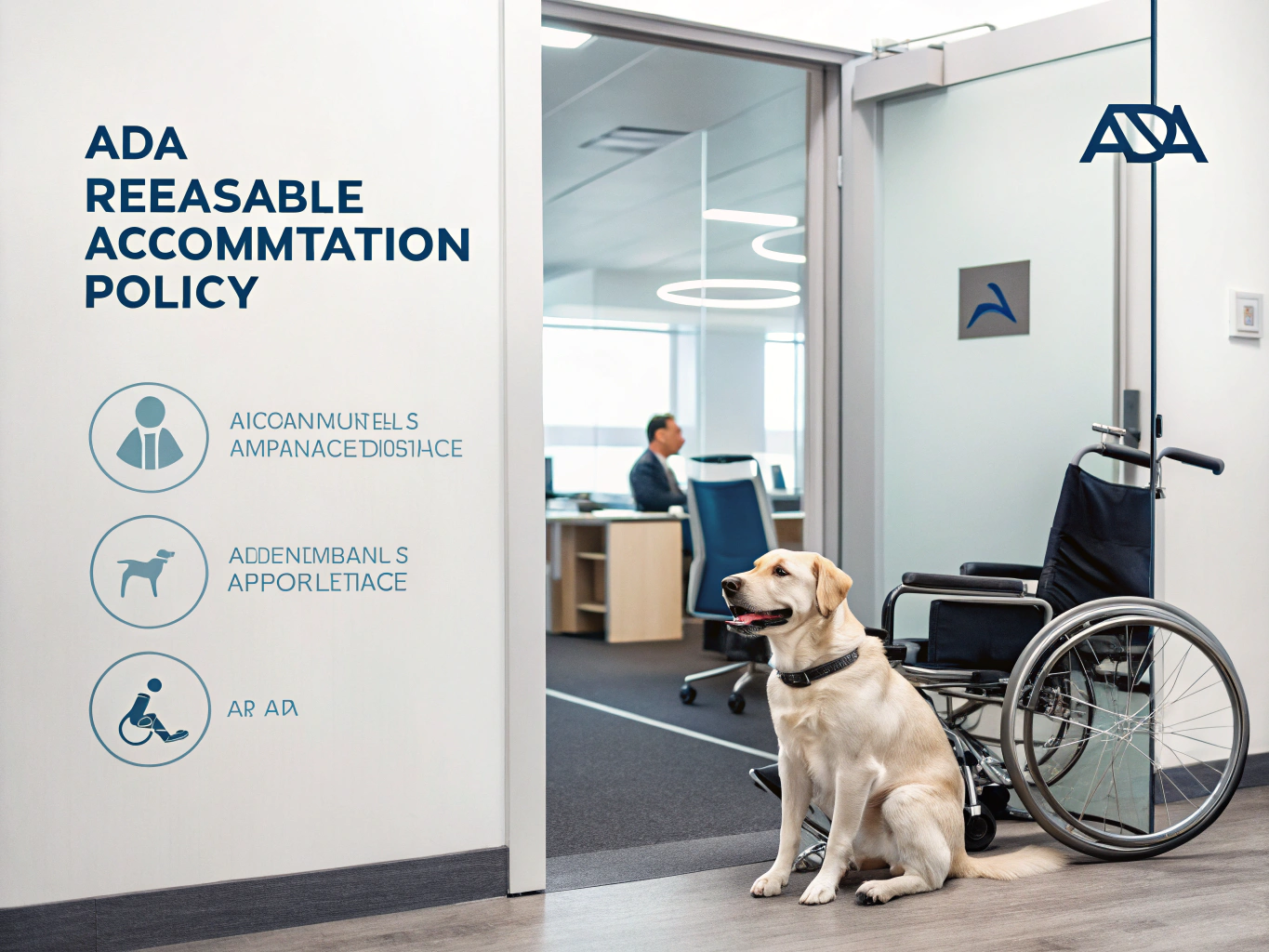Definition
The ADA Reasonable Accommodation Policy for Service Animals is designed to support individuals with disabilities by ensuring they can bring their trained service animals to the workplace. Under the Americans with Disabilities Act (ADA), this policy sets forth the rights and responsibilities of both employees and employers, fostering an inclusive environment where everyone can thrive.
Key Components
Understanding the critical aspects of the ADA Reasonable Accommodation Policy for Service Animals can help create a supportive workplace. Here are the main elements to consider:
- Definition of Service Animals: In accordance with the ADA, service animals are specifically trained dogs that assist individuals with disabilities. They perform tasks directly related to the person’s disability, such as guiding the visually impaired or alerting those with hearing loss.
- Access and Acceptance: Employees and visitors who rely on service animals should be welcomed in all public areas of your organization. This means allowing service animals in offices, meeting rooms, and common areas—anywhere that the general public is permitted.
- Documentation Guidelines: While you cannot require proof of a disability or service animal training, you can ask two specific questions to clarify the need for the service animal: “Is this dog a service animal required because of a disability?” and “What work or task has the dog been trained to perform?” This keeps the interaction respectful and straightforward.
- Behavior and Control: Service animals must be under the handler’s control at all times. This typically means keeping them on a leash, harness, or tether, except when it interferes with their work. A well-behaved service animal not only helps the individual but also contributes to a positive atmosphere in the workplace.
- Cleanliness Standards: Handlers are responsible for their service animals’ hygiene. Ensure that waste disposal supplies are available and clear expectations are set for maintaining a clean environment. A tidy workspace benefits everyone!
- Grievance Procedure: Establish a clear process for addressing complaints related to service animals. This helps ensure that individuals who feel discriminated against have a pathway to resolve their concerns and fosters a culture of respect and inclusion.
Importance in the Workplace
Implementing an ADA Reasonable Accommodation Policy for Service Animals is crucial for fostering an inclusive workplace. Imagine a visually impaired employee who needs their guide dog to navigate the office; without a clear policy, they might face challenges that could hinder their performance or even lead to feelings of isolation. By embracing this policy, you not only comply with legal requirements but also promote a culture of support where every employee can contribute their best work. This can lead to increased morale, higher productivity, and a more diverse workforce.
Best Practices
Here are some actionable best practices to help you effectively implement your ADA Reasonable Accommodation Policy for Service Animals:
- Train Your Staff: Provide training sessions for employees on the ADA and how to interact with individuals who have service animals. This can include role-playing scenarios to foster understanding and empathy.
- Communicate Clearly: Share your service animal policy widely within your organization. Use newsletters, meetings, and bulletin boards to ensure everyone is aware of the guidelines and their importance.
- Create a Welcoming Environment: Make sure your workspace is accessible and comfortable for individuals with service animals. This might include ensuring that doorways are wide enough and that common areas are free from obstacles.
- Regularly Review Policies: Keep your policy up to date with any changes in the law or best practices. Conduct periodic reviews to ensure it continues to meet the needs of both employees and the organization.
- Encourage Open Dialogue: Foster an environment where employees feel comfortable discussing their needs. Encourage them to voice concerns or ask questions about service animals and accommodations.
Legal Considerations
Understanding the legal framework surrounding the ADA Reasonable Accommodation Policy for Service Animals is vital. The ADA prohibits discrimination based on disability and mandates that reasonable accommodations be made in the workplace. Employers are required to comply with these laws, and failing to do so can result in legal repercussions. It’s essential to stay informed about any updates to federal, state, or local regulations that might affect your policy. Consulting with legal experts can also help ensure you’re on the right track.
Conclusion
Grasping the nuances of the ADA Reasonable Accommodation Policy for Service Animals is essential for fostering an inclusive and compliant workplace. By implementing this policy thoughtfully, you create a welcoming environment that supports employees with disabilities and enriches your organizational culture. Remember, recognizing the importance of service animals isn’t just about legal compliance—it’s about valuing every individual’s contribution and enhancing the workplace for all.




